Preschool
K3 & K4
EARLY DEVELOPMENT IS ESSENTIAL
Busy, busy, busy! Your preschooler is a bundle of energy creating a whirlwind of activity. And it’s no wonder! Eighty-five percent of brain growth occurs before the age of five, so this is a vital time in life for growing and learning! Here at Legacy Christian Preschool, we partner with you to help ensure that your little one’s curiosity does not go to waste. Instead of learning from a screen, we feel that your child learns from actively engaging in a wide variety of experiences and learning to interact with others in positive, healthy ways. From learning letters, numbers, and colors to discovering about the world around them, your child will develop essential skills and will be ready to take on the world of elementary school.
ACADEMICS AT A YOUNG AGE
Not to be mistaken for a traditional daycare program, Legacy offers academic programs starting at the age of 3 years old. While our 3-year-olds are learning to socially interact with other students; they are also receiving academic instruction in their alphabet, phonetic sounds, colors, shapes, and numbers.
Our K4 program is an aggressive academic program that focuses on teaching students to read phonetically and the basics of number theory to 100. By starting an academically aggressive program at the age of 4 years old, we are setting our students up for a successful future. We set the bar high, and then teach our children to attain that goal.


.jpg)
.jpg)

.jpg)
_JPG.jpg)
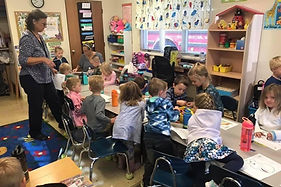.jpg)
Elementary
Legacy offer 2 classes of each grade Kindergarten through 5th grade. This enables us to offer a better student to teacher ratio in those key foundational years. Each teacher is different and that allows us to place students in a classroom setting that will be best for them and their style of learning.
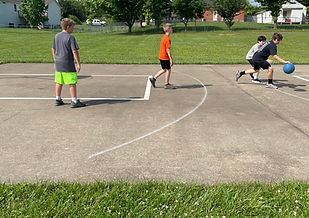
PE
Students will have PE at least once a week. The goal is for the students to be learning the importance of exercise, teamwork, health, and conditioning. We also desire for our students to learn the basics of each sport. Students need to prepare to dress warmly because we try to go outside as much as we can. We are excited to get our new gym and then will be able to do more in the PE program.
.jpg)
Art
Students have art once a week for 45 minutes. The goal is to teach the students to be creative and to develop how to do various artistic skills. Students learn a variety of mediums for art.
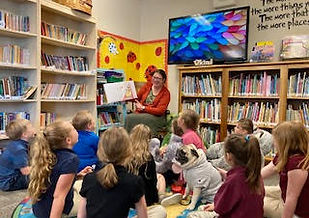.jpg)
Library
Students have a set Library team once every week. During that time they have a story time. They also have a variety of age appropriate activities that try to encourage them to become good readers and to love reading. There is also a time to check out books each week. We love to see students reading!
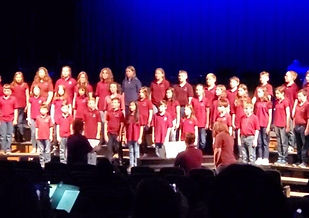.jpg)
Music
Music class meets weekly and the students are introduced to a variety of types of music. We look forward to having our gym built so that we can have the stage and have regular musical programs. We encourage students to use their talents for the Lord in class, in chapel, and in other settings.
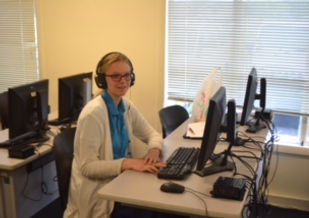
Technology
One day in a future school year, we home to have the elementary classes come to the computer lab for a weekly special to learn the basics of the computer, typing, how to use various programs like Word and Powerpoint, and how to do a research paper.

Spanish
One day in a future year, we hope to have a weekly special that introduces the elementary classes to Spanish.

Spanish
One day in a future year, we hope to have a weekly special that introduces the elementary classes to Spanish.
Lower Elementary
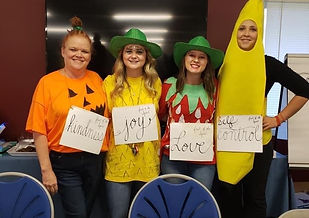_JPG.jpg)
Here at Legacy, we strive to challenge our students academically. Using the Abeka curriculum we help our students achieve at a higher-than-average level. Currently our elementary students who have been in our program for over a year; test a year ahead of their public-school counterparts on average.
How do we achieve this level of education?
The Abeka system of learning, teaches students to read at an early age. By instilling a love of reading at the Kindergarten level; students begin to achieve higher scores in other subjects.
A FIRM FOUNDATION IS FUNDAMENTAL
Your elementary-aged child has so much to learn, and influences at this age will have lasting effects. Studies show that performance at this level can powerfully predict future success. Not only is your child developing literacy, computational, and conceptual skills, he or she is also making psychological leaps at this age as they see themselves as part of the world outside of family. This is a time of developing lifelong attitudes about school and study habits, too. Realizing this, we join you in inspiring lifelong learners who also know how to be loyal friends. Rather than following every new educational trend that comes and goes, we stick to what we know works. With a firm, solid academic start, your child will be prepared to tackle the next level with confidence.
.jpg)
Kindergarten
In K5, your child will learn:
1. Numbers concepts from 1-100 and fractions
2. Life skills including telling time, bill and coins value, using the calendar
3. Addition and Subtraction Families 1-10
4. Learn to recognize the short vowels and their sounds.
5. Learn to recognize the consonants and their sounds.
6. Learn to blend the vowels and consonants.
7. Learn to sound one-vowel words.
8. Learn the sounds of the long vowels + Learn to sound two-vowel words.
9. Learn and apply special phonics sounds.
10. Community Helpers for Social Studies
11. Learning about God's Great World for Science-Animals, Weather, Seasons
Written and oral evaluations are also provided in the book to measure how well your child grasps these important concepts.
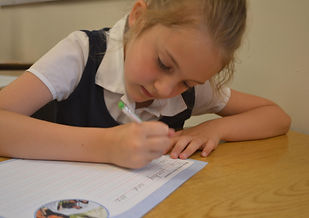.jpg)
First Grade
1st Grade:
The beginning and continuation of cursive writing
Learning the basics of reading and comprehension through phonics
Introducing and completion of charts 6 to 13 for phonics rules
Basic mathematics continuing into harder facts including two and
three digit addition and subtraction.
Learning the concept of weight measurement and understanding inches and centimeters. Basic money facts from penny to a dollar.
Learing simple fractions along with telling time...which includes all minute facts...not just hour...quarter...and half times.
Learning to take cursive writing and language facts, and put them to paper using the student's own words and comprehension skills. Writing stories, letters, paragraphs, etc.
We also work on emphasizing the teaching of manners.

Second Grade
2nd Grade
Phonics: Special sounds, parts of speech, punctuation,
Reading comprehension, creative writing, poetry, cursive,
Math: roman numerals, borrowing, multiplication, division
Science: insects, planets, skeleton, muscles, senses, weather, moon phases
History: American symbols, holidays, Native Americans, States, Continents, careers
Health: manners, food groups, creating a good diet, safety tips
We also do Roman numerals, fractions, types of sentences, proofreading and diagramming.
As well as Bible stories and spelling words/vocabulary words!

Third Grade
Math: The third grade curriculum really focuses on multiplication and division facts. We start with zero and work our way all the way up to 12 in multiplication and division. We also expound on knowledge of word problems as well as start to do some beginning algebra and geometry. By the end of third grade, the student should know all of the multiplication facts by memory.
Language: by this time in language and in their handwriting skills we expect our third graders to have optimal cursive handwriting. With this handwriting, we branch into creative writings with multiple paragraphs. We focus on what makes a sentence (ex. Nouns, pronouns, adjectives, verbs, adverbs, etc.) and how we can take those sentence structures and put them into paragraphs to make a whole story.
Science: in science we focus on the structures of a plant, layers of a soil, the solar system, and five different systems that are within the human body. By the end of third grade they should know how to label the bones and the solar system as well as the layers of soil and earth.
History: in history we start chronologically and work all the way up to present day presidents. We start with Christopher Columbus and we work our way through the timeline all the way up to our most current president in office. We also focus heavily on map skills as an identifying how to read a map as well as naming all 50 states of the United States.
Spelling & Poetry: in their spelling skills they are tested on 20 spelling words as well as five vocabulary words including their definitions. We also touch students on their ability to memorize passages of poetry.
Bible: In Bible be learn about key biblical people like Elijah, Samuel, Elisha, Daniel. We end the year off with the Parables of Jesus.
Intermediate Elementary
At Legacy we refer to our 4th-6th grade classes as intermediate. Our teachers team teach these students with each teacher teaching in the area of their strengths. The students learn to be responsible for taking their materials with them as they switch classes on a smaller scale. This prepares them for the middle school and high school block schedule. This is the time when we also begin to include our students in the school House Teams.
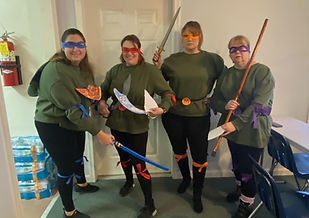
.jpg)
Fourth Grade
In Bible we read lessons on
Adam, Cain, Enoch, Noah, Abraham, Isaac, Jacob, Joseph, and the life of Christ.
ƒWe also study the life of Paul. Students memorize Scriptures throughout the entire year.
Our Reading program is an outstanding variety of children’s literature from famous classics to modern selections encourages young readers to come back for more.
Fourth graders will grow in their ability to read for learning and gain independence through the use of character analysis, setting and plot charting, text structure analysis, and many other activities including creative writing.
In Language students are given extensive instruction on how to write letters, book reports, and even an encyclopedia report. Traditional grammar training continues as students learn to recognize all eight parts of speech; identify simple and compound subjects and verbs; diagram subjects, verbs, adjectives, and adverbs; and learn simple rules for correct usage and subject and verb agreement.
Our Spelling program features a variety of spelling and vocabulary words that are crucial for expanding each students vocabulary.
Health begins with a unit on physical fitness and emphasizes the skeletal, muscular, and respiratory systems. Practical instruction regarding personal hygiene follows a study of the teeth and skin. A chapter on interpersonal relationships teaches students how to have a right relationship with God and with others, stressing the necessity of maintaining close family relationships and the importance of choosing the right friends.
In Science, students are presented with things that they can see, observe, and understand in the world around them. They learn how to make an insect zoo, how to recognize the plants they see every day, how to attract birds to their own backyard, how to use field guides, how to interpret cloud formations, and how to identify rocks.
Our History book is a high-interest, inspiring, narrative approach to American history. The lively writing style and outstanding visual features make the student’s first formal study of United States history a positive, enjoyable experience.
In Math the four basic processes are taught and reviewed, as well as multiplying and dividing by two-digit numbers, estimation, square measures, writing decimals as fractions, and simple geometry. A major emphasis is on working with proper and improper fractions; adding, subtract- ing, and multiplying fractions; and finding the least common denominator. Students will continue to solve multi-step word problems which encourage the application of concepts being learned.
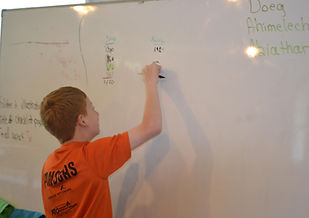.jpg)
Fifth Grade
Fifth grade Bible is filled with many astounding stories about Bible characters such as Moses, Ruth, Daniel, Samuel, Joshua and David. Students memorize Scriptures throughout the year.
Reading inspiring nonfiction, relatable modern fiction, humorous plays, and intriguing classics can all be found in the three fifth-grade readers. Acquaint readers with a variety of genres while studying the parts of narrative and informative text structures.
Our Language program provides a thorough review of capitalization, punctuation, and the parts of speech. Students’ knowledge of grammar and increases their writing skills. Students will be introduced to the four main types of complements and to additional rules for punctuation. They will learn how to diagram prepositional phrases and complements. Students’ writing skills will improve as they learn how to write effective topic sentences and paragraphs and how to use transitional words. Skills learned in outlining, note taking, and preparing a bibliography will aid fifth graders in writing an encyclopedia report and a library research report.
In order to achieve spelling mastery, students must learn how spelling “works.“ Students learn to understand how spelling “works“ by teaching them to examine words and apply spelling and phonics rules. They will also learn the spelling and abbreviation for each book of the Bible and the difference between pairs of words commonly used as synonyms, antonyms, or homonyms.
In Health students learn the significance of maintaining sound health habits. While reviewing the muscular and respiratory systems of the human body, each student is encouraged to measure his level of fitness. An in-depth study of the circulatory system adds to the student’s knowledge of physical fitness. The study of nutrition focuses on the importance of a healthful diet and its effects on overall fitness and personal appearance.
Our Science program leads students continually from the known to the unknown by teaching important science concepts within the context of things they can see and know. The aim is to help students better understand basic science principles rather than to merely teach them science vocabulary.
In History & Geography students are presented with a fascinating study of the Eastern Hemisphere by geographical regions starting with the Middle East, where history began. It not only presents the importance of studying history and the significance of geography, but also describes the beginnings of history from a Christian perspective. Students are introduced to worldwide missions and missionary heroes, while learning about
the history, geography, and culture of these specific locations: Asia, Africa, Europe, Australia, Oceania, and Antarctica.
Our Math course provides an abundant practice of new and review concepts and facts, and daily word problems. Emphasis is placed on topics such as whole numbers, fractions, decimals, measurement and algebraic equations, and basic geometric problems.
Reading 5 equips students to be good communicators with this new comprehension-based reading program. Each component is designed to support teachers as they guide their students to lifelong reading success. Students will have opportunities to interact with literature and informational texts from a variety of authors and genres. They will focus on practicing reading strategies that improve comprehension. This course also includes three novel studies for leveled differentiation.
.jpg)
Sixth Grade
In Bible Sixth graders are looking for heroes, and they will find many to pattern their lives after as they study such outstanding Old Testament figures as Daniel, Elijah, and Esther. They will also learn many important values by studying stories such as the parables of Jesus. Students memorize Scriptures during the year.
In Reading students will enjoy reading exciting selections about animals of all kinds, patriots from America’s past, and Christians in foreign lands. This delightful collection of stories and poems features several well-known authors and introduces students to a variety of interesting characters. Students will read a biographical novel and a Christian fiction novel and use them when writing language book reports.
Our Language program presents grammar, composition, and mechanics in a clear and appealing manner. Students will learn to think and to convey their thoughts more clearly, critically, and creatively.
Our Health book places special emphasis on the study of the endocrine, immune, and nervous systems. Students become familiar with major health concerns such as drug abuse and AIDS, and discover the physical, mental, social, and spiritual effects of these problems on the individual and on the nation.
Our Science program presents the universe as the direct creation of God and refutes the man-made idea of evolution.
Observing God’s World features photos, art, and charts that clearly illustrate the science concepts being taught. Students will apply what they have learned by doing projects and experiments both at home and at school. Some of the topics students will study include invertebrates, plants, forces of the earth, the universe, space travel, and matter and chemistry.
In Spelling students learn the spelling and meaning of words through the study of prefixes, roots, and suffixes. They will be able to spell and recognize thousands of words after learning these common roots, prefixes, and suffixes.
In History students are offered a Christian perspective on the history and geography of North and South America. It includes a chapter on Canada and a chapter on the recent events in the United States and around the world.
Our Glencoe Math Course 2 covers ratios and proportional relationships, expressions and equations, geometry, and statistics and probability.
Reading 6 will enhance your child’s reading comprehension skills while extending his or her love of reading while it emphasizes reading comprehension and other skills necessary for academic success and for life. The reading books are filled with engaging, illustrated character-building stories that reinforce biblical truth and introduce students to several genres of literature.
Secondary
High School
EMBRACING CHALLENGE
The academic program at Legacy Christian Academy places an emphasis on every aspect of student growth and development, while meeting state requirements. Suitable class sizes and exceptional, qualified teachers allow us to offer a comfortable and inclusive educational environment, while ensuring each student receives the individualized attention and support, they need.
PROPER PREPARATION IS POWERFUL
High school is an exciting time for your child. With growing confidence, high schoolers meet many developmental milestones. They are better able to reason and think more abstractly. Peer relationships take on new importance at this age. Teenagers also begin thinking about their future and setting goals. At Legacy Christian Academy, we partner with you to navigate this important stage. One of our goals is to prepare them for the next phase of life by offering a wide variety of academic opportunities to match each student’s strengths. We also strive to help your child grow morally and begin to consider how he or she fits into the larger world around them with our ultimate goal being that they follow God’s will. With high standards carried out in a loving environment, we help your child reach his or her full potential and develop into the wonderful adult God created him or her to be.

Dual Enrollment
LCA offers Dual Enrollment options. It is our desire as much as possible to have it so that the students can take the classes that they need and to take them on the legacy campus.
Students can take Dual Enrollment classes through Liberty University online in our computer lab. Liberty is accredited and therefore, these classes usually transfer to any college the student chooses to attend.
LCA also has an agreement with Southeastern College. Southeastern is also accredited and the credits will usually transfer. The goal of this program is to have an LCA staff member who has a master’s degree in the subject and is working as an adjunct professor for Southeastern teach the classes at LCA. That way the student can earn college credits from an accredited college without having to leave our campus. They can still learn in a Christian environment from a Christian teacher.
Any other dual enrollment would need to be pre approved by the Principal.
.jpg)
Electives
Each year the electives that we offer will depend on the staff and the availability in staff schedules. Some potential electives may be choir, band (at some point in the future), worship team, Saints Media Crew, PE, Home Ec, Journalism, Yearbook, SAT Prep, teachers aid, study hall, Health and First Aid, Chess, Drama, Creative Writing, Art, forensics, Photography, and potentially additional options from year to year.

Technology
In middle school the students begin to learn typing and the basics of the computer. They learn things like Word and Powerpoint so they now have to do their papers and projects.
In high school the students will take a basic technology class that is an overview of all areas of technology (the components of the computer, the Office Suite, a little coding, graphic design, computer safety, email, videography, gaming, and more)
After taking the basic technology class, students can go deeper into the areas that interest them. Students can take design class where they learn to design things such as bulletins, and much more. They can also choose a web development class where they will learn alot about coding, setting up websites, and more. One of the more popular classes is a videography class where they learn to take videos of the many activities that happen around our school, they learn to edit the videos, and they post them to our school YouTube channel for parents to view.
Middle School
A SMOOTH TRANSITION IS SIGNIFICANT
Your child is at the important stage of transitioning from elementary school to high school. At Legacy Christian, we don’t get caught up in the biased view that adolescence imposes problems. Sure, this is a challenging stage that necessitates a unique approach. The physiological changes in your child no doubt affect his or her academic, social, and emotional development. That’s why we carefully consider each child. Understanding that they are no longer little children yet are not yet teenagers, we seek to nurture and mentor these young adolescents in a way that fosters their growing interests. We offer a variety of meaningful and engaging learning experiences that help prepare them for high school.
ACTIVE LEARNING
The transformative learning process at Legacy Christian Academy is designed to help our students grow both in and out of the classroom. Each day is filled with opportunities to experience new educational and social situations to further development. Our teachers create a safe and open setting, where they can guide students in exploring the world around them.
.jpg)
Language
Students have the opportunity to learn Spanish 1-4. In the future we would like to be able to offer things like Latin, French, and sign language.

Sports
High school students are expected to earn a full PE credit.
LCA also offers a variety of sports based on the amount of interest. Our Athletic Director is open to considering additional sports if we had the interest and the means to offer it.
.jpg)
Music
Legacy offers music classes for middle school and high school. Students will have the opportunity to perform in chapels, Grandparents Day, Veterans Day, a Christmas Program, a Spring Program and more.
Students will also have the opportunity to take the worship team elective and to help lead the music for chapel services. We love student led activities and seeing them use their talents for the Lord.
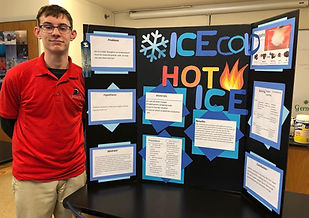
Science Fair
Each spring students in grades 7-12 compete in a school wide Science Fair.
Students are taught the principles of experimenting as well as how to form an hypothesis. They work on the proper step of evaluation and they learn how to display their findings.
We set a side a few days where the projects are set up to determine the winners in a variety of areas.

Honors Classes
Once a student hits 7th grade they have to opportunity to go into different academic tracks and levels. We have separate levels for a variety of classes, especially the math and science classes.
Students can choose to take regular level or honors level classes. The honors classes will be taught at a higher level, they will require more work, they will cover more material. Honors level classes are on a 5.0 grade scale as opposed to the standard 4.0.
Honors students are on track for an Honors level diploma.

Art
Students will learn a variety of things in Art class. Some of those would include:
Drawing/Line Drawing with markers
Watercolors Techniques (resist, salt, lifting, wet-on-wet, wet-on-dry)
Tempera Painting (mixing paints, tints, and tones)
Paper Cutting and Collage
Form-Based lesson (Ceramics)
Art History (Artist, Culture)
Oil Pastel Lessons
Chalk Pastel Lessons
Portraits
Ceramic Tile Mural
Modern Artist
Colored Pencils/Charcoal
International Student Program
Legacy has an International Student Program, and we have the ability to accept through SEVIS students from all over the world. It is good for our students to be able to interact on a daily basis with those from a different culture.
This year we have students from China, Vietnam, and Colombia. It is not uncommon to also have students from Korea, Nigeria, South Africa, Germany, Russia, Ukraine, and many others.
If you are an International student and you are looking to consider Legacy, please email Admissons@legacychristian-academy.com to ask questions about the process and to find out the International student tuition rates.
If you have potential interest in hosting an international student, please look for information under “Info” and please reach out to
.jpg)
.jpg)
_JPG.jpg)
Achievement Testing
Each spring our students take the Terra-Nova testing. These tests allow parents to see where their students are academically. It also helps us as a school to be able to monitor how our students and teachers are doing.
NILD/Discovery Program
The Discovery Program exists to provide help to students who have learning issues. A certified therapist from the NILD (National Institute of Learning Development) will pull a student out of class for 1 hour twice a week. This is not tutoring. The goal is to use the methods of NILD to help a student develop technics to use both sides of their brains. The goal is to help the student to become an independent thinker. The therapy is designed to target a student’s deficit areas. The program develops critical thinking skills, memory, problem solving skills, language skills, and a variety of other skills. It is also trying to help the student improve the processing of what they see and hear.
There is an additional charge for the therapist, but it is significantly cheaper than the sessions would be with a therapist outside of LCA.
In some cases, a student will come into Legacy with a 504, IEP, or ISP. Legacy does not follow the state requirements for those, and we do not have the full resources to be able to do all of those. However, we will review them, and the parents, therapist, and Principal will determine what accommodations LCA may be able to offer. Those agreed upon accommodations will be shared with the teachers and monitored by the therapist. There is an Accommodation Management fee for this. Whenever possible we hope to have the therapist go along with the parents to any IEP type meetings so that the school can be there to help the family and also to be able to come back and share things with the teachers that may help the student to be successful.
Dual Enrollment
LCA offers Dual Enrollment options. It is our desire as much as possible to have it so that the students can take the classes that they need and to take them on the legacy campus.
Students can take Dual Enrollment classes through Liberty University online in our computer lab. Liberty is accredited and therefore, these classes usually transfer to any college the student chooses to attend.
LCA also has an agreement with Southeastern College. Southeastern is also accredited and the credits will usually transfer. The goal of this program is to have an LCA staff member who has a master’s degree in the subject and is working as an adjunct professor for Southeastern teach the classes at LCA. That way the student can earn college credits from an accredited college without having to leave our campus. They can still learn in a Christian environment from a Christian teacher.
Any other dual enrollment would need to be preapproved.




Clubs
Each year, teachers have the opportunity to offer after school clubs in an area that they have special interest in. If the teachers offer any, they will be announced at the beginning of the school year and students can choose if they want to attend. Depending on the club, there may be a small fee.
